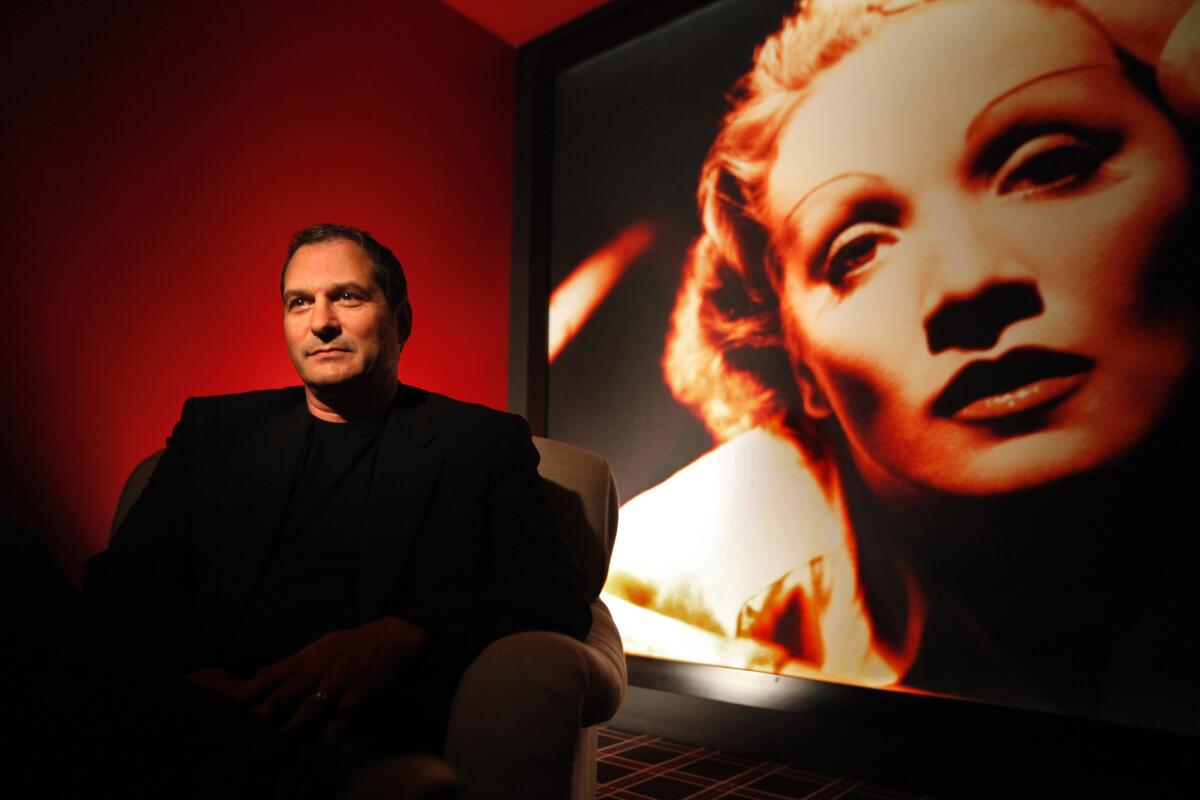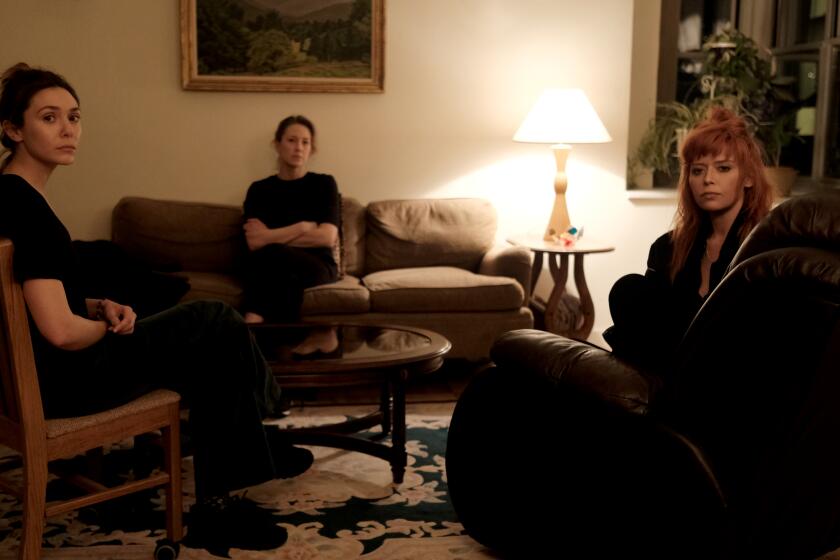TV is viewed as holding more promise for screenwriters than movies

Scott Frank likes to call himself “the least bitter writer in Hollywood,” and given how much success he’s had in his 30-year career, you could argue he should be. These days, though, reflecting on the state of the film industry that he loves, he has a hard time sounding upbeat — and in that, he undoubtedly reflects the sentiments of a lot of his fellow screenwriters.
Frank, 54, has carved out the kind of career that any Hollywood writer would envy. He has worked with talented filmmakers such as Jodie Foster (the 1991 child-prodigy drama “Little Man Tate”), Barry Sonnenfeld (the 1995 Elmore Leonard adaptation “Get Shorty”), Steven Soderbergh (the 1998 crime comedy “Out of Sight,” also adapted from a Leonard novel), and Steven Spielberg (2002’s sci-fi film “Minority Report”). He has received an Academy Award nomination and a Golden Globe nod, among other honors. Every major studio has him on speed dial and, when a problematic script needs the trusted touch of a seasoned pro, he routinely gets the call.
But when he looks back on his rise to the upper ranks of the screenwriting food chain, Frank can’t help thinking it never would have happened if he were starting out today.
Over the last few decades, as the studios have shifted their business models toward making fewer, bigger would-be blockbusters, a certain kind of movie that used to be the bedrock of American cinema — namely the kind aimed at adults who didn’t necessarily grow up surrounded by stacks of comic books — has gotten only more difficult to make. Unfortunately, that just happens to be the kind of movie that Frank, like many of his peers, aims to write.
“I’m sure ‘Out of Sight’ wouldn’t get made today,” Frank said recently. “‘Little Man Tate’ definitely wouldn’t be made. Even ‘Get Shorty’ is a struggle to get made today. They’re all tricky movies that probably wouldn’t happen.”
Laments about the death of intelligent, adult-oriented movies are nothing new, but it is unusual to hear a writer of Frank’s stature voice them quite so bluntly. And it’s sobering to think that even movies as crowd-pleasing as “Get Shorty” and “Out of Sight” might be a tough sell in today’s Hollywood, at least on the studio level.
“It’s gotten harder to make movies about people,” said writer-director Miguel Arteta, 49, who has chronicled the lives of ordinary folks in indie films like “Star Maps,” “The Good Girl” and “Cedar Rapids.” “There’s not that big a variety in the types of movies that get made. People don’t take a chance on material as much as they used to. The kind of character-driven stories that we were making in the late ‘90s and 2000s — all that stuff has moved to cable.”
It’s been said many times that it’s a miracle that any movie ever reaches the screen. But as the studios have pared their slates, films about characters who don’t wear capes or dodge explosions, whose dramas emerge from the stuff of everyday life, have disproportionately fallen by the wayside. Despite being based on Lawrence Block’s bestselling Matthew Scudder novels, it took more than a decade for Frank’s new crime drama, “A Walk Among the Tombstones” — which opens Sept. 19 with Liam Neeson starring as an ex-cop trying to solve a string of kidnappings — to reach the big screen. “They haven’t made movies like this for a while,” Frank said. “It helps if you have Liam Neeson.”
In this climate, fewer and fewer younger screenwriters are coming into the film industry and gaining a foothold. According to the Writers Guild of America’s 2014 annual report, since 2008, writers ages 41 to 50 have replaced writers ages 31 to 40 as the group enjoying the largest share of employment in the movie business. Meanwhile, over the past five years, total earnings for work in film reported by WGA members has dropped more than 24% as a number of studios have cut back on production.
Frank and Arteta are each part of the generation that came of age in the 1970s, when maverick filmmakers like Francis Ford Coppola, Martin Scorsese, Hal Ashby and Robert Altman were rewriting Hollywood’s rule book, and each established his career in the ‘90s. At the time, screenwriters were riding high, with big-payday spec-script deals like Shane Black’s record-setting $4-million sale of “The Long Kiss Goodnight” in 1996 regularly making headlines, while the independent film business was booming.
Today, Frank says, rather than springing from the imagination of a screenwriter like him, mainstream movies are more often being reverse-engineered from something an audience is already familiar with — a superhero, a toy, a video game, a TV show — to give a studio an easy sales hook.
“There’s been a big change in the time I’ve been doing this, and that’s been the rise of marketing-based decision making,” Frank said. “Everything comes from marketing. Marketing is now even part of the greenlight process. Once you believe you have a formula and you know what people are going to see, all the movies tend to become similar.”
Author and screenwriter Jonathan Tropper particularly mourns the dearth of the sort of adult-oriented family dramedy studios used to routinely make. He hopes that “This is Where I Leave You,” which opens Sept. 19 and is based on his 2006 bestseller, helps bring them back.
“The stuff that made me want to be a screenwriter were movies like ‘Annie Hall,’ ‘Terms of Endearment,’ ‘Jerry Maguire,’ ‘As Good as It Gets,’ ‘Almost Famous,’” said Tropper, 44. “They’re still making them on the microbudget level, but the studios make them very selectively now, if at all.”
That said, there is still a place where screenwriters can find a welcome home for that kind of spandex- and CGI-free storytelling. For better or worse, it’s called television. From the perspective of writers — as well as directors, actors and many moviegoers — the big screen’s loss has been the small one’s gain.
“I still love movies, but if I were entering the business now, I think I’d probably want to begin in the world of TV because I could do the kinds of stories I want to do there,” said Frank. “In a way it’s the opposite of what it was in the late ‘60s and early ‘70s.
“Back then television was kind of playing to the masses, so film decided as a way of competing to be provocative and interesting. Now it’s the opposite, where the provocative adult entertainment is happening on TV and a lot of directors, actors and writers [from the film world] are looking at television in a way they hadn’t before.”
He knows because he’s one of them. Frank wrote and directed a pilot for a dark comedy series for FX this year, but it wasn’t picked up.
As for Arteta, while he has found steady work in television on series like “Enlightened” and “Nurse Jackie” and is developing TV projects, he insists he believes passionately in movies — his next one, the Disney family film “Alexander and the Terrible, Horrible, No Good, Very Bad Day,” opens Oct. 10.
“My wife and I went to see ‘Boyhood’ opening weekend and the audience was full and was as excited as I’ve seen an audience in years,” Arteta said. “I think there is still a great hunger for wonderful movies. They just have to connect on an emotional level. They have to have more of a sweeping element to them. But people will go see them.”
More to Read
Only good movies
Get the Indie Focus newsletter, Mark Olsen's weekly guide to the world of cinema.
You may occasionally receive promotional content from the Los Angeles Times.











